
An AI ethicist is a multifaceted professional who brings both technical acumen and a deep understanding of ethical principles to the table
This is an exclusive article series conducted by the Editor Team of CIO News with CP Singh, Founder of Smart24x7 Response Services Private Limited (A unit of Smart Group).
As a Chief Technology Officer with 2+ decades of experience in the tech industry, I’ve witnessed firsthand the rapid evolution of artificial intelligence (AI). This progression has brought to the forefront the crucial role of AI ethicists, a position that has become indispensable in modern organizations. Let me share my perspective on why AI ethics is a cornerstone of responsible technology development and how aspiring professionals can excel in this field.
The Necessity of AI Ethics in Today’s Technological Landscape
AI is no longer a futuristic concept; it’s deeply integrated into our daily operations. However, with great power comes great responsibility. AI systems, if not properly guided, can lead to unintended consequences that may contradict our societal and moral values. This is where the AI ethicist steps in. These professionals are not just add-ons but essential players in ensuring that AI development is aligned with ethical principles.
As someone who has led tech teams and been at the helm of decision-making, I understand that embedding ethical considerations into AI development is not just a moral imperative but a business necessity. It’s about building trust with customers and stakeholders, mitigating risks, and ensuring legal compliance.
The AI Ethicist: A Critical Role in the Tech Ecosystem
An AI ethicist is a multifaceted professional who brings both technical acumen and a deep understanding of ethical principles to the table. Their responsibilities are diverse and impactful.
- Policy Development: Crafting guidelines and policies that set the ethical framework for AI projects.
- Risk Assessment: Identifying and mitigating potential ethical risks associated with AI applications.
- Cross-Functional Collaboration: Working alongside engineers, legal teams, and managers to integrate ethical considerations into the entire lifecycle of AI development.
- Education and Advocacy: Promoting an understanding of ethical AI practices within the organization.
Skills and Pathways to Becoming an AI Ethicist
In my years of experience, I’ve seen that the most effective AI ethicists possess a blend of technical knowledge and ethical foresight. Here’s what you need:
- Educational Foundation: A combination of computer science and social sciences or philosophy provides a balanced perspective. Advanced degrees with a focus on AI ethics are increasingly valuable.
- Practical Experience: Internships, research projects, and collaborative initiatives offer real-world exposure to ethical dilemmas in AI.
- Networking and Continuous Learning: Engaging with the AI ethics community through conferences and forums is crucial for staying abreast of evolving challenges and solutions.
Proactive Strategies for Ethical AI in Business
As a CTO, I advocate for a proactive approach to ethical AI:
- Developing an AI Ethics Strategy: This involves identifying risks, ensuring fairness and transparency, and safeguarding privacy.
- Fostering an Ethical AI Culture: A company-wide commitment to ethical AI is essential.
- Regular Policy Review and Adaptation: Ethical guidelines must evolve with technological advancements and societal shifts.
Conclusion
AI ethicists are the bridge between technology and societal norms, ensuring that AI’s advancement benefits all stakeholders while adhering to ethical standards. As technology leaders, we must champion the integration of ethical practices in AI to foster trust, innovation, and sustainable growth.
For those aspiring to this vital role, I recommend leveraging educational opportunities, gaining hands-on experience, and actively engaging with the AI ethics community. Remember, the path to becoming an AI ethicist is as dynamic as the field itself—be prepared to adapt, learn, and lead in this exciting and essential domain.
Also read: Transforming Developer Productivity and Organizational Dynamics in this AI Revolution
Do Follow: CIO News LinkedIn Account | CIO News Facebook | CIO News Youtube | CIO News Twitter
About us:
CIO News, a proprietary of Mercadeo, produces award-winning content and resources for IT leaders across any industry through print articles and recorded video interviews on topics in the technology sector such as Digital Transformation, Artificial Intelligence (AI), Machine Learning (ML), Cloud, Robotics, Cyber-security, Data, Analytics, SOC, SASE, among other technology topics.





